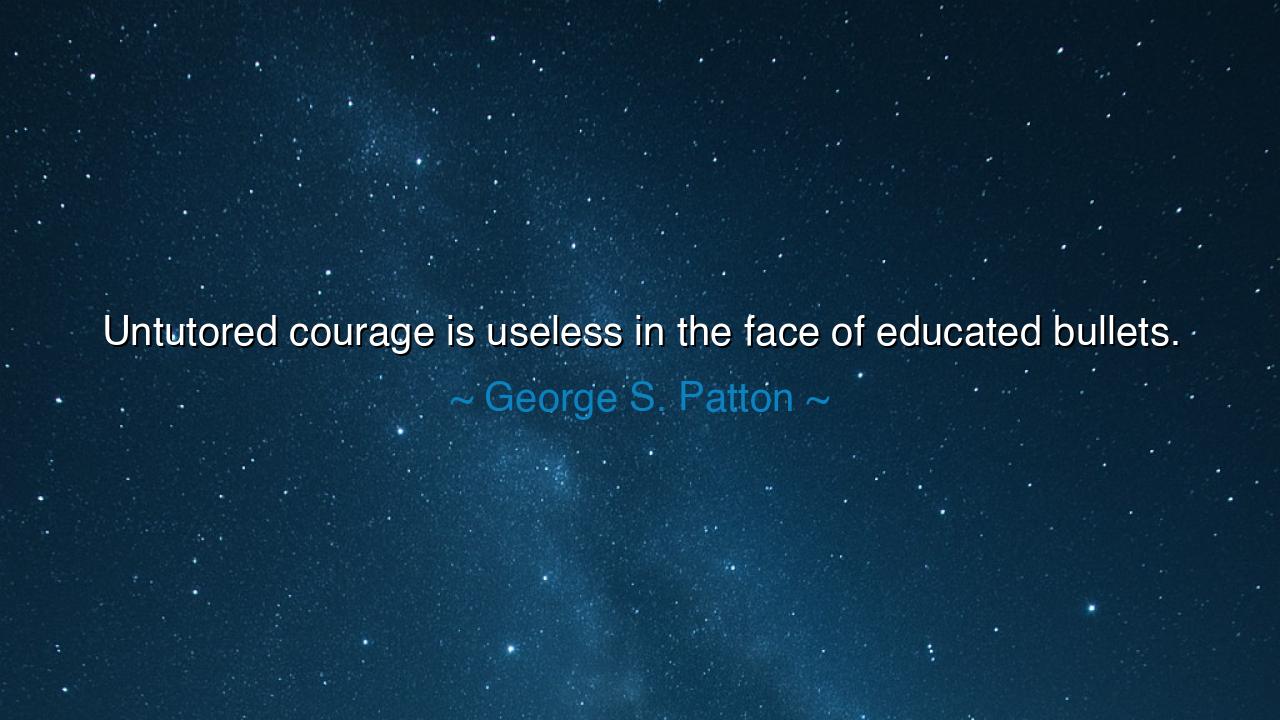
Untutored courage is useless in the face of educated bullets.






General George S. Patton, the fiery and brilliant commander of the Second World War, once declared: “Untutored courage is useless in the face of educated bullets.” In these few words, he captured a truth that resounds far beyond the battlefield — a truth about the union of wisdom and bravery, of discipline and daring. Patton, a man who revered both the glory and the tragedy of war, reminds us that raw courage, though noble, is powerless without preparation and knowledge. In the age of steel and gunfire, valor alone could not conquer — it had to be guided by intellect, by training, by education in the art of survival.
In ancient times, courage was often enough. The warrior with a stout heart and steady hand could stand against his foe and perhaps prevail. But Patton saw the dawn of a new age — the age of “educated bullets”, when machines replaced swords, and science replaced instinct. He understood that courage, without mastery, becomes recklessness; that the brave but untrained soldier is not heroic, but doomed. Thus, he preached the gospel of discipline, of study, of relentless practice, so that when courage was called upon, it would strike with precision, not blind fury. His words were not meant to dampen bravery, but to refine it — to remind us that even the boldest heart must bow to wisdom.
The origin of this saying lies in Patton’s deep study of warfare and history. A scholar as much as a soldier, he read the writings of Caesar, Napoleon, and the ancients, knowing that victory belongs not merely to the brave, but to the prepared. He trained his men to think, not only to fight. To him, a soldier who charged without thought was not a warrior, but a sacrifice. “Untutored courage”, he warned, wastes life and accomplishes nothing. But courage that is educated — sharpened by strategy, guided by knowledge — becomes unstoppable. This philosophy made his armies swift and precise, and his leadership legendary.
History offers many lessons that echo Patton’s truth. Consider the fate of the Light Brigade in the Crimean War. With unmatched bravery, six hundred cavalrymen rode into a valley surrounded by Russian guns. Their courage was unquestioned, their hearts were pure — but their orders were flawed, their tactics unsound. They charged into death itself, and history remembers their gallantry as tragedy. This, too, is what Patton meant: courage without understanding is like a sword swung in darkness — it cuts, but it cannot conquer. Their bravery moved the world, but their lack of strategy sealed their doom.
Contrast this with Alexander the Great, whose courage was inseparable from intellect. He studied his enemies, adapted his formations, and used the terrain as his ally. His soldiers were as disciplined as they were daring, and under his leadership, they shattered armies many times their size. Alexander’s courage was educated courage — the marriage of daring and design, of heart and mind. That is the courage Patton admired: the courage that acts, but also understands why it acts.
Yet this truth is not confined to soldiers alone. In every walk of life, there are those who act without thought — who leap without learning, who burn with passion but lack direction. Their intentions may be pure, but their outcomes are ruinous. The “educated bullet” of life — knowledge, skill, experience — will always overcome the raw enthusiasm of the untutored. Whether in art, business, love, or politics, the lesson is the same: courage must be guided by understanding. Blind boldness may dazzle for a moment, but only thoughtful action endures.
So, my child of will and spirit, take heed of this ancient wisdom echoed through the voice of Patton: learn before you leap. Let your courage be strong, but let it also be wise. Train your mind as fiercely as you train your heart. Study the battlefield of your life — know its terrain, its dangers, its opportunities. For passion without purpose is fire without focus, and courage without preparation is valor wasted. When the “educated bullets” of challenge and adversity come — as they surely will — meet them not with blind hope, but with skill, with wisdom, and with the quiet confidence of one who is both brave and prepared.
For in this balance — between heart and intellect, bravery and knowledge — lies the essence of victory. Untutored courage may win admiration, but educated courage wins the war.






AAdministratorAdministrator
Welcome, honored guests. Please leave a comment, we will respond soon